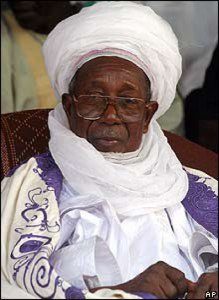
The late Ibrahim Dasuki

Sa’ad Abubakar 111, the reigning Sultan of Sokoto

Chief Olusegun Obasanjo, military head of state who approved the 1976 local government reform
The passage of Alhaji Ibrahim Dasuki, the 18th Sultan of Sokoto, last Monday provides an occasion for reflections on a forgotten dimension of his life but which rings too much of a bell in national life. It is his landmark intervention in the administration of local governments as a tier of government in Nigeria when he served as the chairperson of the committee which wrote the 1976 “Guidelines for Local Government Reform”. It was that report which, paradoxically, took power from the aristocracy and handed it over to the children of the Talakawa throughout Nigeria. It is unthinkable that a prince of the Sultanate of Sokoto (as he then was) would carry out such a bloodless revolution but he did. As the Chairperson of the committee, there is no way such would have been possible if he did not personally agree with it.
It is certainly unthinkable that the report would have seen the light of the day if the troika running the country at that time, (Generals Obasanjo, TY Danjuma and Shehu Musa Yar’Adua) as well as other members of the Supreme Military Council did not see the point about the report. However, that does not reduce the import of the late Sultan in this matter since the framework and the specific submissions contained in the report came from the committee he chaired and which dissolved the Native Authority system throughout the country. Hitherto, emirs and chiefs were the chief executives of what are today called the local governments, from Sokoto to Borno, Bauchi, Katsina, Zaria, Ibadan, Onitsha, Lagos and everywhere else. From these emirs and chiefs who were unelected, he took away the authority over local administration and, instead, brought the traditional authority under the control of children of commoners. He, therefore, not only democratised the local government system, the democratisation was so profound that it has the status of a revolution, bloodlessly executed by a prince and a future Sultan. Some analysts go as far as noting how, by implication, even the Oba of Lagos, the Obi of Onitsha, the Shehu of Borno, the Tor Tiv, the Sultan, the emir of Kano, the Ooni of Ife, the Oba of Benin, the Gbong Gwom Jos and all the very powerful traditional rulers in the system are, in theory, lacking the executive authority a councillor has today. The traditional authority are still powerful today because power itself is very diffuse and comes through sources beyond executive authority.
The question which has worked up analysts is how Ibrahim Dasuki came to author the landmark intervention even as a prince with ambition to mount the throne of the Sultan of Sokoto? One line of argument on this has been the claim that his formal training in local government administration, his experience in the Native Authority system where he was the Permanent Secretary and his overall exposure gave him tremendous knowledge that overcame his princely background or constituency consideration in favour of such a profound democratisation. In other words, he had by training and experience, become highly modernist in orientation that no background could halt the genie. And his reconstruction of the Sultan’s Palace when he eventually became the Sultan is also cited to support this analysis.
Not only did his report underpin the dissolution of the Native Authority system and eradicated the tinge of colonialism embodied in the nativity in the name, it also recommended the quality of people to whom local government administration should be handed over to. Only experienced, tested hands did his committee recommend, people whose pedigree the traditional rulers would reckon with. It is argued that this recommendation explains the emergence of certain persons as heads of local governments after 1976. The most notable example in this regard is Alhaji Shehu Shagari who became the chairperson of Shagari Local Government Council from the pedigree of a former Minister for Economic Planning and later of Finance under the Gowon administration. It was from the Chairperson position he went on to become the president of Nigeria in 1979. In other words, Dasuki tried to safeguard his ‘revolution’ in the hands of people with pedigree, character and balance to run the local government system if it was being taken away from chiefs and emirs. That provision did not reduce the profundity of the democratisation engineered by his 1976 report.
Today, it t is generally accepted as a matter of regret that a prince of Sokoto will occasion such degree of democratisation of access and power only for elected governors and local government chairmen to make a mess of the local government system. It is an anti-climax for a scion of the aristocracy to have brought a revolution to the Talakawa but for the Talakawa to undermine it by the corruption, arbitrariness and ineptitude that are found in LG administration in Nigeria now. Pundits fear that if care is not taken, the contradiction could produce a surprise for everyone. The freewheeling democracy Nigeria practices without a care for leadership recruitment and testing is feared to be capable of producing a Nigerian equivalent of a Donald Trump sooner than later
Meanwhile, in time, when the revolutionary import of his intervention in local government administration is more studied and reflected upon, his place in history might overshadow that of many others, notwithstanding whatever other human failings.
May Alhaji Ibrahim Dasuki’s soul rest in peace!





























1 Comments
EJILA EJEMBI ACHADU
IAM SO HAPPY THAT THIS INTERVENTION HAS COME TO STAY BECAUSE IT HAS THE TRUTH AND IT CARRIES ONE ON A LONG TIME MEMORY LANE. IT’S VERY EDUCATIVE. I LIKE IT SO MUCH AND ALWAYS LONG TO READ IT. I DO WISH THE PUBLISHER GOD’S WISDOM.*** EJILA EJEMBI ACHADU***